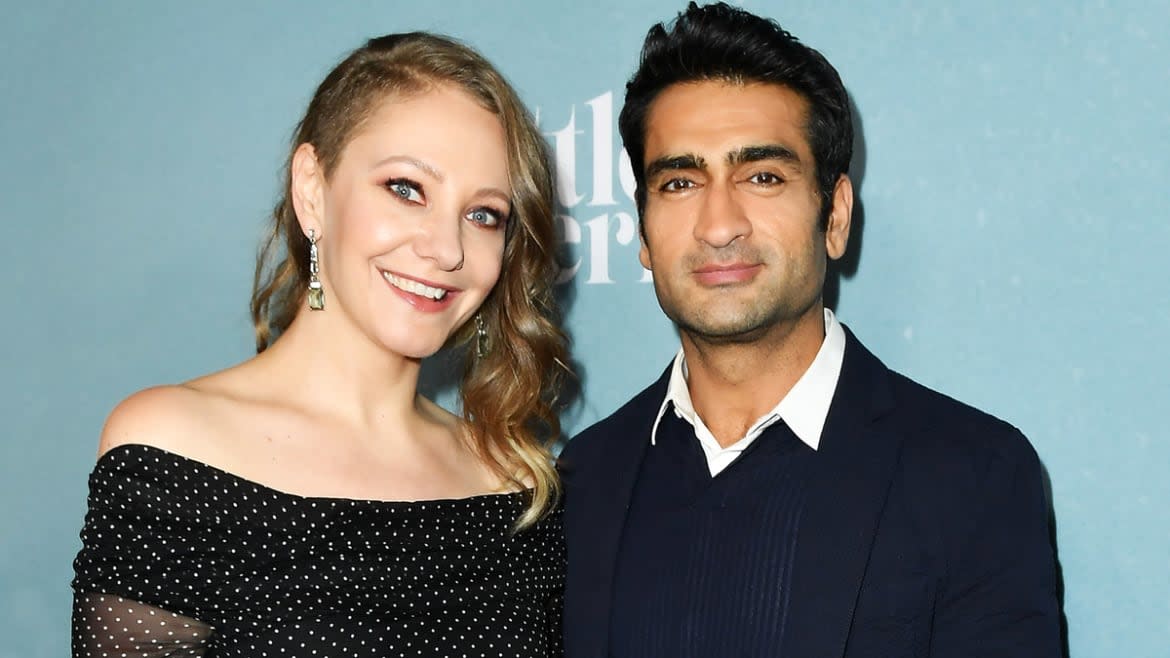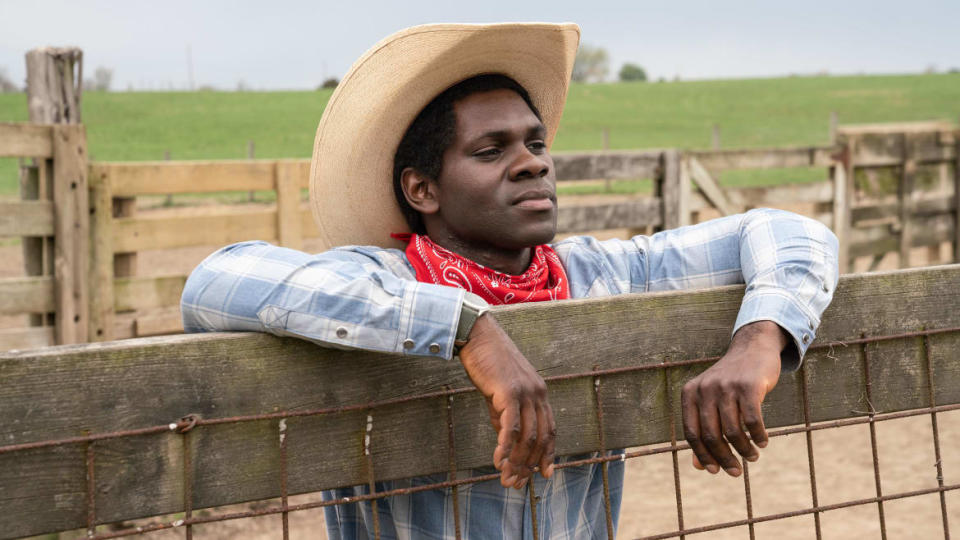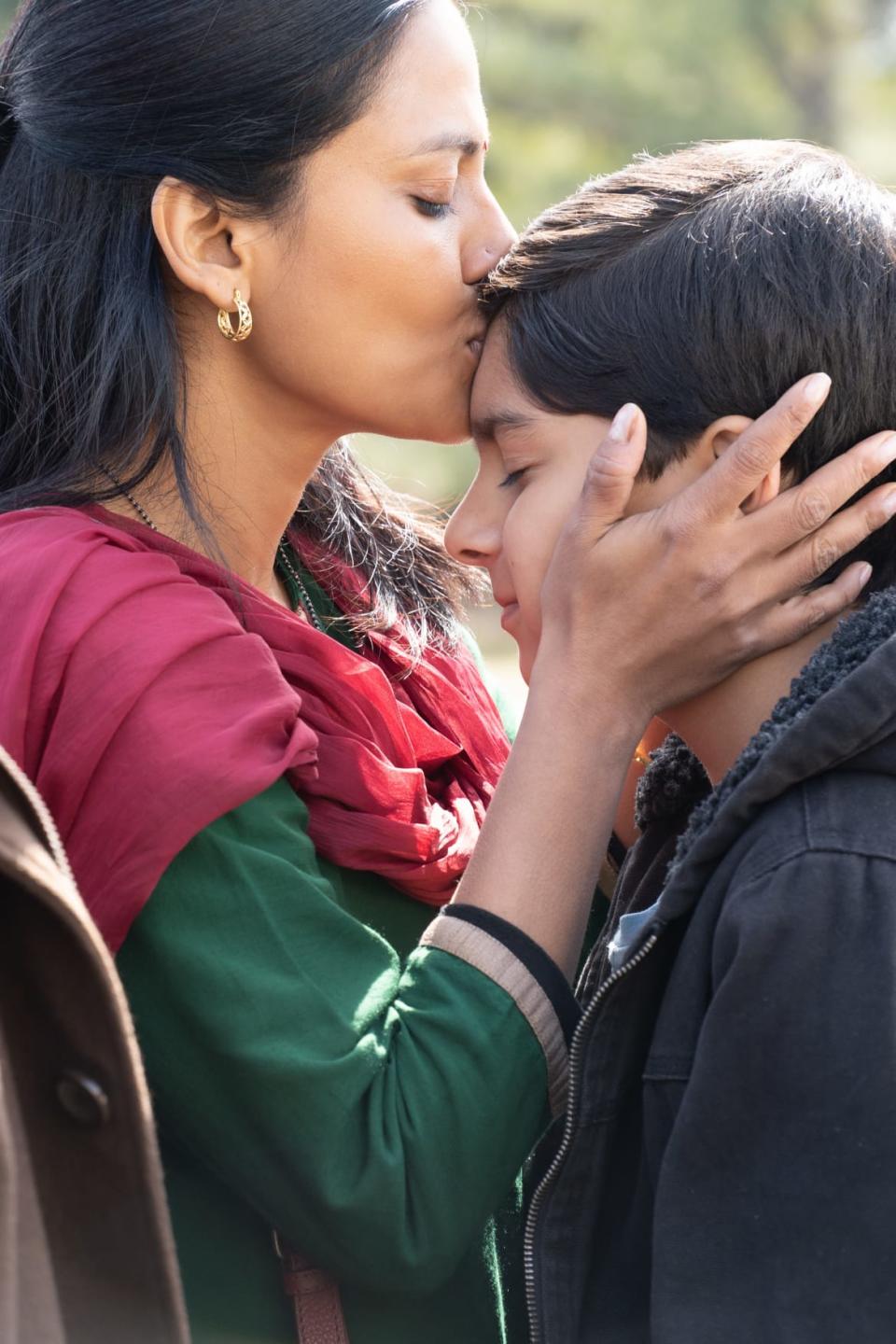Kumail Nanjiani and Emily V. Gordon on Why Hollywood Was ‘Scared’ of ‘Little America’s’ Immigrant Stories

There is a pivotal moment in the Apple TV+ anthology series Little America that so many of us can relate to—a character is weeping to a Kelly Clarkson song.
The circumstances in this case are incredibly specific. A gay man from Syria named Rafiq (Haaz Sleiman) is fleeing violent persecution from his family, seeking asylum in the United States at the encouragement of a Kelly Clarkson-loving confidante. After a torturous amount of time spent waiting in hiding, his asylum is finally granted.
When he arrives, his friend takes him to a place he never thought he’d see in his lifetime—a gay club—to experience something he never thought he’d feel: safe and accepted. A drag queen on stage is lip-synching to Clarkson’s “Breakaway.” Rafiq is overcome. He bursts into tears.
“It’s such a great ending, right?” Kumail Nanjiani says, as his wife and writing partner, Emily V. Gordon, laments that her attempts to befriend the lip-synching drag queen, RuPaul’s Drag Race alum Chi Chi Devayne, came up short.
The pair, who were nominated for an Academy Award for writing The Big Sick, which was based on their relationship and starred Nanjiani, executive produced Little America alongside their writer/producer friends Alan Yang (Master of None) and Lee Eisenberg (SMILF).
The series’ eight episodes, which launched Jan. 17 on Apple’s streaming service, are all inspired by true stories about immigrants in America, revealing the often inspiring, romantic, and humorous parts of the immigrant experience that are rarely told.
As The Daily Beast’s Melissa Leon wrote, the series is “a beautiful love letter to immigrants,” capturing them as “real, ordinary people—as fuck-ups, goofballs, dreamers, and drifters, as flawed and uncertain as every other American.”
Arriving at a time when discourse surrounding immigration is as explosive as it’s ever been, the inclusivity of Little America’s storytelling makes the case for it being the most important series that Apple TV+ has released yet.
The stories are specific: a gay man flees Syria, an undocumented teen become an unexpected squash phenom, a promising Nigerian college student turns to cowboy culture to assimilate, a young boy takes over his family’s motel when his parents are deported, an Iranian father is determined to build a family home on a craggy piece of land. But the revelation is how universal, even American, elements of their experiences are.
Conversation about the show gets off to a giggly start, what with the talk about drag queens singing Kelly Clarkson and the fact that Nanjiani and Gordon are fresh off an interview with Gayle King on CBS This Morning that went off the rails once everybody started gushing over Nanjiani’s newly ripped body.
(In December, the Pakistan-born Silicon Valley actor, known for playing nerds and everymen, just about broke the internet when he unveiled an impressively chiseled torso in a shirtless Instagram post, touting the work he put in for his role in Marvel’s upcoming The Eternals.)
“She warned us,” Gordon says of the segment, in which King said, “Kumail, it’s all I can do not to ask you to remove your shirt,” as Nanjiani’s dozen or so abs were beamed onto a 12-foot screen behind them. “Some of the interviews we've done, you can see a photo of Kumail poking out from under their notes and I'm like, we know what you're gonna do.”
“At least we knew what was coming,” says Nanjiani, who has settled into a bemused sort of resignation over his body becoming a headline-making phenomenon. His shirtless photo has even appeared in his hometown Pakistani newspapers, after all.
But talk of superhero movies and RuPaul’s Drag Race stars and worship of Kelly Clarkson is certainly on topic with Little America, which interrogates the various ways immigrants from other cultures interact with American pop culture—both in their home countries and when they come to the States.
“American culture is unavoidable wherever you're from,” Nanjiani says.
When he and Gordon began dating, they bonded over their love of ’80s movies. But she laughs remembering a peculiarity she noticed when she started to become close to Nanjiani’s Pakistani parents, who came to the U.S. 15 years ago.
“One of the American shows that made it to Pakistan when he was growing up was Picket Fences,” she says. “You know that huge hit show Picket Fences that we all know about. The most popular show ever. It's my favorite thing. Like I'll be with Kumail's family, and they'll all start talking about Picket Fences. And I'm like, this has never happened before.”
“There's just something about pop culture that has the power to sort of unite us, and I think that was an interesting thing to be able to tap into the show,” Nanjiani says. After all, he adds, “Kelly Clarkson speaks to everyone.”
Little America, in some ways, grew out of an episode of Master of None.
The second episode of the Netflix series, which star Aziz Ansari co-created with former Parks and Recreation producer and writer Alan Yang, is arguably the one that put the show on the map.
Titled “Parents,” it was a love letter to Ansari and Yang’s actual immigrant parents. Ansari’s family is from India. Yang’s is from Taiwan. The half hour centered on the complicated dynamics the first-gen characters based on them—Dev and Brian—have with their families, while also paying tribute to what it took for them to build a life in America.
It won Ansari and Yang a 2015 Emmy Award for Outstanding Writing in a Comedy Series, while becoming the focus of critical praise, think pieces about representation and storytelling on TV, and fan adulation.
For Lee Eisenberg, it made him think about his father, who emigrated to the U.S. from Israel in 1976 with no money and broken English, yet made a life for himself. “Parents” was an episode of television that resonated with him unlike anything he had seen before. “I started thinking, well, what if there was a series in which every episode felt like that?” he says.
He reached out to Joshuah Bearman, who co-founded Epic magazine and began assembling stories about real-life immigrants’ everyday lives in America. Yang, Nanjiani, and Gordon joined as executive producers, with the latter two co-writing an episode, “The Rock,” with Eisenberg.
The very existence of Little America is inherently political and disruptive, much in the same way an episode like “Parents” being so successful in Master of None is. It combats the idea that culturally specific stories aren’t impactful or appealing to a wider mass culture. The fight for that existence, however, is still an uphill battle.
“Pitching this was tough,” Nanjiani says, as both he and Gordon adopt an instantly weary look at the mention of it. They began shopping Little America in 2017, two Oscar nominees alongside seasoned producers Eisenberg and Yang doing the pitch-meeting carousel around Hollywood, yet striking out each time.
“We were like, we have a great idea: an anthology show based on true stories of immigrants,” Nanjiani says. “Rarely can you pitch a show in one line and have it sound so compelling. We pitched it a lot. And honestly, most people were very scared of it. Even though streaming has given more opportunities to stories from different perspectives. I think a lot of people are still set in their old ways.”
He lets out an exasperated sigh: “I wish I could name all the places that just didn’t want to do the show.”
“They would say, ‘This is so important! But we’re not interested,’” Gordon remembers. Nanjiani recounts another missive: “‘Good luck! ‘I hope that show finds a home somewhere.’”

For his part, Yang wasn’t entirely surprised. When he was starting out, he was terrified to write stories with Asian-American characters. “One, there weren’t many actors who were famous enough to get a show made,” he says. “Two, there hadn't been one for 25 years or so,” when Margaret Cho’s All-American Girl was on air.
He remembers that, at one point, he and Greg Daniels, the mastermind behind The Office and Parks and Recreation, were developing a show together about a father and son, and Yang made the characters white. Daniels suggested making them Asian, to be closer to Yang’s own experience. “But I was like, I don’t think they would make that,” he says. “And I don’t think I was wrong 10 years ago. That’s changed rapidly.”
Certainly, the rhetoric when it comes to immigration in the United States has escalated in the three years since the group first began talking about Little America. But it was never the creators’ intention to make a political series, in so much as these stories told by actors and characters rarely centered in American pop culture are already political in their own right.
“We didn't want to make any explicit political points, other than show immigrants as human beings, which in this day and age is seen as a radical political stance,” Nanjiani says. “We knew that it was going to come out at a very specific point in American history. And we wish it had come out at a time when immigrants weren't so demonized.”
“No matter who's president I would like to think we would have still wanted to make this show, of course,” Gordon says, to which Nanjiani agrees: “I think the show would have been great no matter what. It’s not like anti-immigrant sentiment is a new thing.”
But in a strange way, that’s the entry point into Little America. You may not know what it’s like to come from Nigeria in order to study economics at an American university and not be able to hear from your family and constantly worry for their well-being as the government back home collapses. But you know what it feels like to be alone, or scared, or hopeful in the face of stark odds.
“If every episode was about how difficult the immigration process was, now it's a show about the immigration process,” Gordon says. “We wanted to focus on the whole person instead of just their struggles with the immigration system. Too often the story of the immigrant is like, ‘Oh, look at the struggle. Aren’t they so noble?’ And people absolutely do struggle. But we really want to show all the parts of the experience, not just that struggle. I think that’s reductive.”
And with just eight half-hour episodes, the strides Little America makes when it comes to representation, both for the actors involved and for the people watching from home, cannot be undersold.
Eisenberg brings up the fact that there were two episodes that took place in the Middle East. “In both of those episodes, the main actors’ IMDb credits are just terrorists,” he says. “I mean, literally every single character. Like one was a terrorist from Jack Ryan. The other one was a terrorist from Homeland. Both good shows. Both good performances. But they've never played a different scene. I think one of the actors was saying that he’s never had a scene where he’s walked with groceries that didn’t have a bomb in it.”

Audiences, too, have already reached out in appreciation, explaining that, in many cases, it is the first time they have seen a character from their home country on screen for the full 30 minutes of a TV episode. Even one of the show’s publicists, whose name is Kabeer, shared that Little America marks the first time he’s ever seen a piece of pop culture in which a character has his first name.
“That’s amazing,” Nanjiani says, though, outside of The Big Sick, which he co-wrote and starred in, he still hasn’t had that experience himself.
“It’s kind of a rare name,” he shrugs. Though there was the time in seventh grade when a new brand of condensed milk came out, spelled Comelle, but pronounced similarly. The slogan for it, unfortunately, was “thick, sweet, creamy milk.”
“That’s your Tinder bio!” Gordon teases.
“That really ruined my life,” Nanjiani laughs. “So I will say the first time I saw my name in pop culture was a very negative experience. Kids were yelling at me on the playground: ‘Hey, Kumail! Can we have your thick sweet creamy milk?’”
It’s why it’s all the more important, Yang stresses, that creators like him and Nanjiani and Eisenberg fight for their platforms and tell their own stories. Who knows if Little America would have been possible if Gordon and Nanjiani hadn’t written The Big Sick. Or if he and Ansari hadn’t made the “Parents” episode of Master of None.
He remembers that eureka moment vividly. He and Ansari had just gotten the green light for Master of None from Netflix. They were in a hotel room, banging their heads on the wall trying to figure out what the show would be.
“I was like, look man, whatever happens, my dad grew up in a hut in Taiwan the size of this corner of this room, and he had a pet chicken that he had to kill for dinner because they didn’t have any food to eat,” he says. “And now I’m in New York City making a TV show, and we get to do whatever we want with it.”
It was one of those record-scratch moments in life that stop time. “We were just like, wait! That’s the show. And then Little America, this may just be the blown-out version of that.”
Got a tip? Send it to The Daily Beast here
Get our top stories in your inbox every day. Sign up now!
Daily Beast Membership: Beast Inside goes deeper on the stories that matter to you. Learn more.

